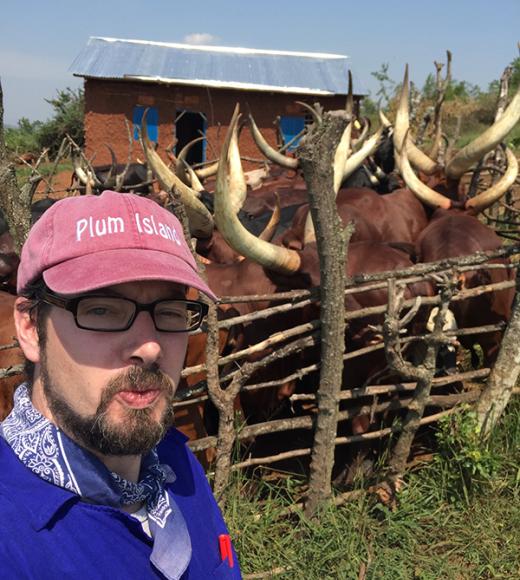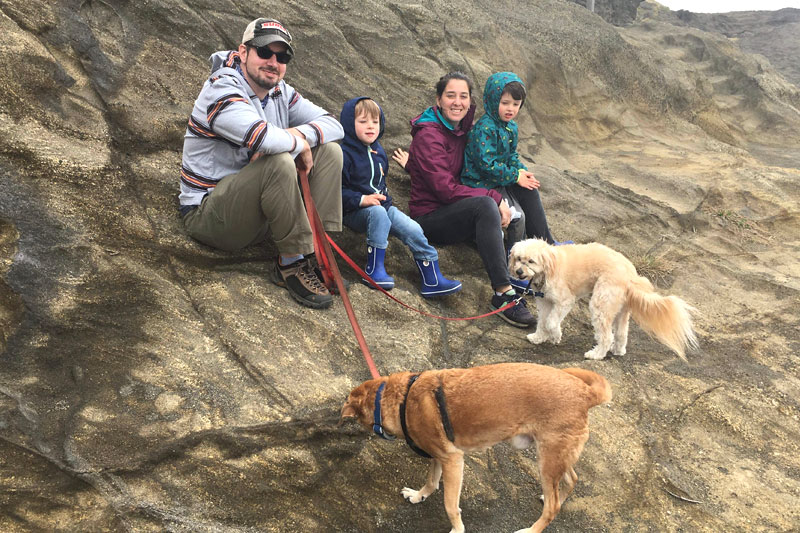Macdonald Farnham

Dr. MacDonald Farnham, DVM, MS, CPH is a veterinarian with the University of California, Davis One Health Institute, where he works on the USAID funded One Health Workforce - Next GEneration project. Mac is also a father and is married to another veterinarian (they met while working on an Exotic Newcastle outbreak in California). What really struck us during the interview (and after reading his CV) is the sheer diversity of topics and places where Mac has worked ! From working as a Peace Corps volunteer in Cameroon, as a swine and turkey researcher in Minnesota (separate gigs), to working as a food safety veterinarian in New Zealand and a Foreign Service Officer with the United States Department of Agriculture in Japan, Mac’s curiosity in the world around him clearly sets the tone for his professional career!
Veterinary School & Year Graduated: University of Minnesota, 2006
Additional Degree: MS in Veterinary Medicine, University of Minnesota, 2002; Post-Doctoral Residency in Veterinary Public Health, University of Minnesota, 2010
Questions and Answers
- Tell me about your most challenging and rewarding veterinary jobs or work experiences.
- Each progressive job gets more challenging and more rewarding. My current job is very rewarding. I get to work with some awesome global health and One Health colleagues at UC Davis and some great partners in Southeast Asia and Africa implementing transformative change through the USAID funded One Health Workforce - Next Generation project. One thing that always impresses me about students, health professionals and scientists from around the world who are passionate about conservation, biodiversity, and infectious disease research. It’s exciting to bring all the expertise together and also help train early career veterinary and public health students and facilitate collaboration. The uncertainty in my current position can be challenging, but also exciting! I have ever-changing priorities that keep me on my toes.
- What did you love about the position or experience?
-
I love working with a diverse, international and multidisciplinary team to address global health challenges like emerging infectious diseases, food security and biodiversity preservation. There's so much expertise out there and my current role helps me connect and transfer that knowledge and expertise to and from students and faculty alike. That's what I get really excited about.
- Tell me about your journey to get to that point in your life.
- IIn undergrad I double majored in biology and environmental studies and quantitative methods/computer science. After undergrad I felt really drawn to live and work in a developing country. My parents inspired me from a young age to seek a diversity of thought and culture and emphasized that it’s what makes us stronger and better human beings. It’s important to not just think about your own life and background, but also consider what you are doing in your local community and how that impacts the world. Following my undergrad degree, I served as a Peace Corps volunteer working on agroforestry and womens’ farming projects in Cameroon in West Africa. Following the Peace Corps I worked as a wildlife control technician which inspired me to pursue veterinary medicine. After completing veterinary school, I followed my wife to New Zealand where I worked as a veterinary technical supervisor overseeing lamb and mutton export and while my wife worked on her PhD. After moving back to the United States, I completed a postdoctoral residency in veterinary public health at the University of Minnesota which led to an Assistant Professor position. I then transitioned into working in Washington, DC as an agriculturalist for the USDA and following that I worked for USDA APHIS International Services as an agricultural attache in Japan. I then spent two years as Director of Training for the Global Health Program based at the Smithsonian’s National Zoo in Washington DC and finally now in my current gig with the One Health Institute at UC Davis.
- As a veterinary student, did you ever imagine yourself taking this journey and having these professional experiences?
- I never really imagined this particular journey but I always saw the veterinary degree as a door opener to multiple fields. I've never really looked back.
- In retrospect, what do you wish you’d known as a veterinary student or early in your career?
- My major stumbling blocks were biochemistry, physiology - the in-depth technical stuff. I never saw myself becoming a full-on clinician so I had a hard time motivating myself in those classes.
- Would you have changed anything about your time in veterinary school?
- I wish that veterinary exams weren't on Monday mornings -- I’m a big NFL fan and my Sundays were always occupied with watching games.
- Would you have changed anything about your career path since graduating?
- I like to think that the greatest rewards come with some risk, so really no regrets! I’m married to someone that has encouraged me to always chase interesting and cool opportunities. For instance while I was working in Japan my wife got to work on a military base and also worked at an animal shelter in Guam. I sometimes reminisce I would have stayed in particular places or roles a little longer, but think that's part of how we develop.
- Did you have any mentors or role models along the way that helped or inspired you? Please provide an example of how they helped you or what qualities they had that made them a good mentor? How did you find them?
- My advice is to look for people that will give honest feedback and challenge you to grow and apply knowledge in innovative ways. Seek out folks that will give you honest feedback, push you out of your comfort zone, expect more of you than you might expect of yourself and challenge you to do more and do better. Try to not be intimidated by people in interesting roles and positions and go ask them questions to learn more about what they do and how they got where they are. I also think that co-workers, colleagues, and peers make great mentors and they don't necessarily need to come from the same discipline or field of work. It comes down to learning from a diversity of perspectives.
- Tell me about any pivotal moments or key turning points that shaped your career.
- Death of family members, getting married, having children, my mother getting sick with lung cancer, and my father passing away were all very pivotal moments in my life and career. I was working on Newcastle's disease research in southern California when my dad got sick and the USDA flew me out to Minnesota to see him. That’s when I realized that there are some really good and caring people at the USDA, which ultimately inspired me to work with them.
- Tell me about one or two challenges, setbacks or obstacles that you faced along the way on your professional journey. How did you address those?
- My pivotal moments have been really great challenges that forced me to to re-explore and reevaluate where I am and where I see myself and in five years. Relying on soft money and writing grants at University of Minnesota was a big challenge and kind of shaped the rest of my career. I still write a lot of grants but now it’s more for other people, especially young professionals.
- What are the most important lessons you learned as a veterinarian, and still remember today, and would want to tell vet students about.
- Don't be afraid to fail, you will learn from the "bad" experiences, just do no harm and try to not let things get you down. I think another really important lesson is to seek out critical feedback. And for folks that are interested in doing stuff that's off the beaten path, the best advice I can give is to pursue the things that interest you, challenge yourself to be out of your comfort zone because that's where you grow. The best advice I can give is to chase after the things that interest you, challenge yourself to be out of your comfort zone because that's where you grow.
- What’s been the biggest highlight of your career so far?
- My highlights are my contributions to improve One Health capacity and competency in Africa, specifically my work with One Health Central and Eastern Africa Network and helping develop train-the-trainer programs in One Health leadership. Also, working with veterinary and public health students to facilitate multi-disciplinary cross-cultural collaboration has been incredibly meaningful.
- Is there anything else you’d like to tell me that you think would be helpful or relevant to veterinary students or early career veterinarians?
- One Health is this realization that humans, animals and our shared environments are interconnected and interdependent. The great thing about the veterinary field is you never get pigeonholed, you're never stuck in one thing, and when you get frustrated or tired of whatever you're doing in your current job, there are so many additional opportunities.

